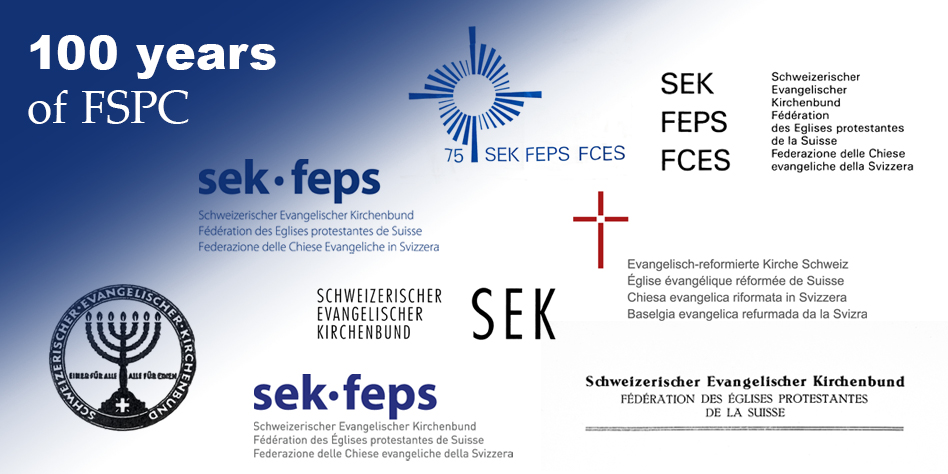
A century of history
In the service of Reformed Protestant churches
What began as a church federation intended to better represent Swiss Protestantism during the post-war years has since grown into a Reformed Protestant church com-munion. This retrospective touches upon the most important and impactful events from the history of the federation.
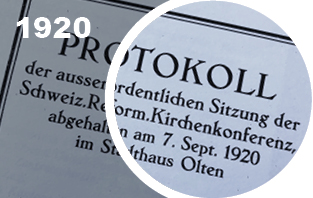
The Federation of Swiss Protestant Churches was founded on September 7 in the Olten Town Hall by 32 delegates from 15 Reformed cantonal churches and two diaspora organizations. The Federation replaced the Swiss Protestant Church Conference, which had been in place since 1858, to pursue a twofold objective. Internally, it was to promote the common actions of Swiss Protestantism and strengthen its representation at the national and international levels. Externally, it was to serve, as the Protestant representation of a neutral country, as an international hub for the reconstruction of churches in post-war Europe. The FSPC was then led by a seven-member board and two parttime secretaries (one each for German-speaking and French-speaking Switzerland). The General Assembly was the highest body of the organization, whose resolutions held a certain binding force. The member churches remained autonomous and free, maintaining their own particular character, while however forming an alliance within the FSPC.
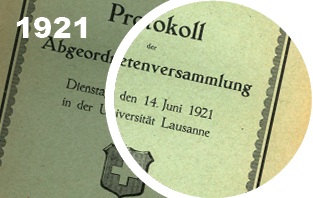
Churches from Geneva, Neuchâtel and Vaud became FSPC member churches.

Admission of the Episcopal Methodist to the Federation
Opening by the FSPC of the Central Office for Church Aid in Zurich
Opening by the FSPC of the Central Office for Church Aid in Zurich
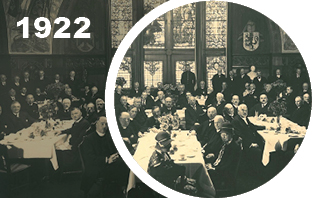
The Federation became a member of the Alliance of Reformed Churches (now World Communion of Reformed Churches – WCRC).

Founding of the Schweizerischen Verbands für Innere Mission und Evangelische Liebestätigkeit (“Swiss Association for Inner Mission and Neighborly Aid”) to group together numerous agencies and organizations.

The FSPC participated in the founding of the International Institute of Social Sciences in Geneva.

The Swiss churches in Genoa (1924), Florence (1928), Marseille (1929), London (1933), and Barcelona (1934) all joined the Federation.

Founding of the Social Commission to engage in a dialogue between economists and theologians
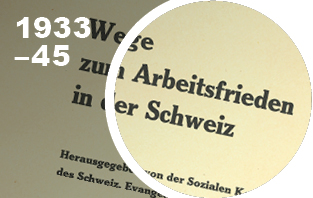
Commission for Social Work: the FSPC placed its focus on promoting peace, a ban on the export of weapons, and on asylum policy.
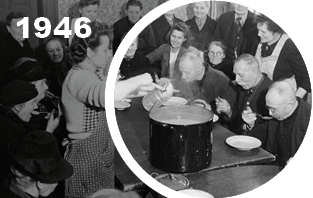
Efforts to assist people living in precarious conditions in war-torn Europe led to the founding of Swiss Church Aid (HEKS/EPER), based in Zurich. HEKS/EPER took on Protestant activities to support refugees in Switzerland. Since 1954, the organization has been active in Third World developmental aid.
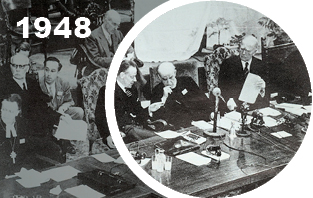
The FSPC joined the World Council of Churches upon its first Assembly in Amsterdam. The Federation thus represented its member churches on the international stage. The FSPC was to report back to the Swiss churches on the achievements of the ecumenical movement.
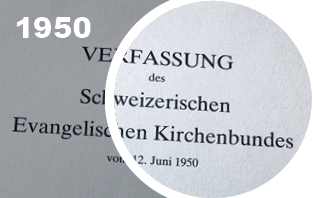
Until this point in time, the Federation had chiefly had a unifying and integrational effect.
A partial revision of the constitution led to the version that remained in effect, in broad strokes, through the end of 2019. It reflected a stronger common will and expressed the foundations of the faith.
A partial revision of the constitution led to the version that remained in effect, in broad strokes, through the end of 2019. It reflected a stronger common will and expressed the foundations of the faith.
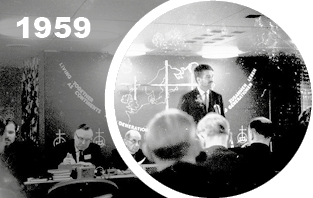
The Federation joined the Conference of European Churches (CEC).

The Brot für Brüder (Pain pour les frères / “Bread for Brothers”) fundraising cam-paign was carried out for the first time. A second campaign followed from 1964 to 1967 and a third began in 1969. A close relationship developed with the campaign’s Catholic counterpart Fastenopfer / Action de Carême. A permanent foundation was founded in 1970, which has continued under the name Brot für alle (“Bread for all”) since 1991. Originally conceived for developmental aid, the organization has devel-oped into an advocate for relations between rich and poor countries in an increas-ingly globalized world.
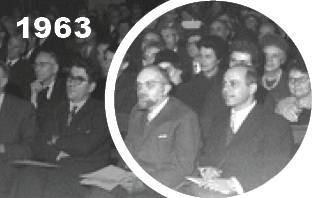
The Protestant churches of Western Switzerland combined the activities of several mission societies to found the Département missionnaire, now known as DM-Dynamique en échange.
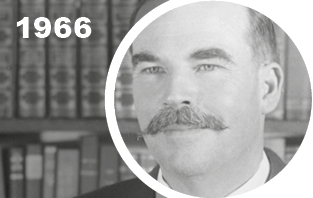
The American John Jeffries V left his entire estate and fortune to the FSPC. Thanks to his donation, the Federation was able to purchase the building at Sulgenauweg 26 in Bern, which has served as its headquarters ever since.
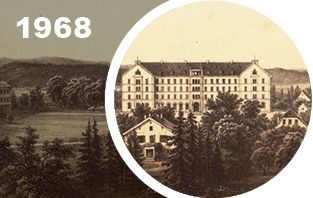
The Basel Mission, founded in 1815, and other mission agencies founded the Co-operation of Protestant Churches and Missions in Switzerland, which existed through the year 2000.

The Conference for Church and Society organized by the WCC inspired the FSPC to found the Institute for Social Ethics, which was integrated into FSPC headquarters as the Institute for Theology and Ethics (ITE). The ISE in Bern and Lausanne provides a Protestant basis for an in-depth social discussion within church and society.
Until 1970, the FSPC placed its focus on ecumenical efforts and engagement with social concerns and issues involving developmental policy. The mass media were discovered as a new means of proclaiming the faith.
Maja Uhlmann of Zurich was the first female representative to be elected to the FSPC board, remaining in office for eight years.
Until 1970, the FSPC placed its focus on ecumenical efforts and engagement with social concerns and issues involving developmental policy. The mass media were discovered as a new means of proclaiming the faith.
Maja Uhlmann of Zurich was the first female representative to be elected to the FSPC board, remaining in office for eight years.
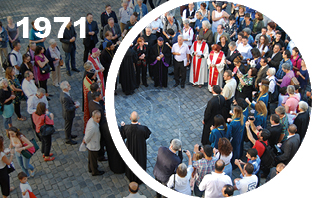
The FSPC was a co-initiator of the Arbeitsgemeinschaft christlicher Kirchen in der Schweiz (AGCK – “Working Community of Christian Churches in Switzerland”).

Declaration of the mutual recognition of baptism among the FSPC, the Swiss Bishops’ Conference, and the Christian Catholic Church
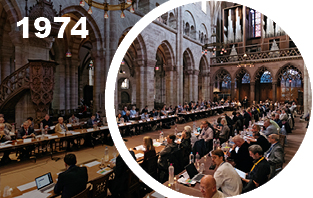
The FSPC became a member of the Leuenberg Church Fellowship, now the Communion of Protestant Churches in Europe (CPCE).
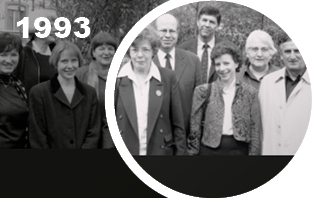
Founding of the Stiftung der Gemeindediakonie (“Foundation for Parish Diaconal Work”) within the FSPC, now fondia (since 2008)

Founding of the Diaconal Conference, known since 2017 as Konferenz Diakonie Schweiz
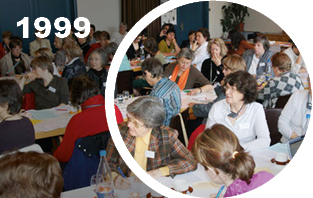
Founding of the Women’s Conference on 7 June 1999
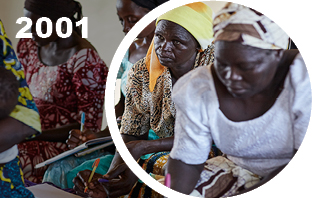
The Swiss mission organizations founded Mission 21, with the Basel Mission as its largest supporting association. Mission 21 is a global community of partner churches and organizations, anchored in the Christian faith, working towards a life in dignity for all.
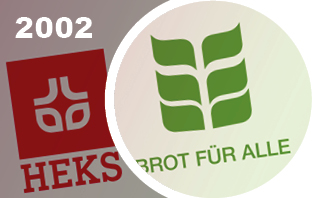
Swiss Church Aid (HEKS/EPER) and Bread for All reorganized as foundations within the FSPC
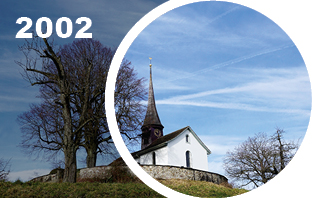
The diaspora associations of Central and Southern Switzerland disbanded over the course of time. Independent Reformed churches emerged in each canton, which successively joined the FSPC. The Federation now comprised 26 member churches.
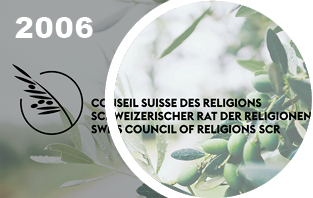
The FSPC became a founding member of the Swiss Council of Religions (SCR).

The FSPC and its member churches took part in national, regional, and local events to mark the 500th anniversary of the Reformation, together with other Protestant churches around the world.

The Federation of Swiss Protestant Churches decided to reorganize itself as the Protestant Church in Switzerland (PCS) beginning in 2020 and to adopt a corre-sponding constitution.
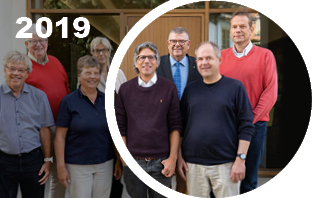
Founding of the Conference of Protestant Solidarity Switzerland (PSS)
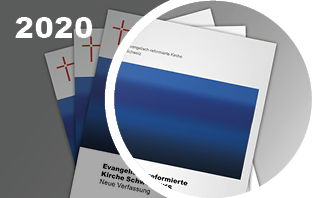
The Federation of Swiss Protestant Churches (FSPC) became the Protestant Church in Switzerland (PCS).
The agencies HEKS/EPER and Bread for All merged into a single organization with the name Hilfswerk der Evangelisch-reformierten Kirche Schweiz (“Swiss Church Aid”) to further optimize the impact of their projects and activities within Switzerland and abroad.